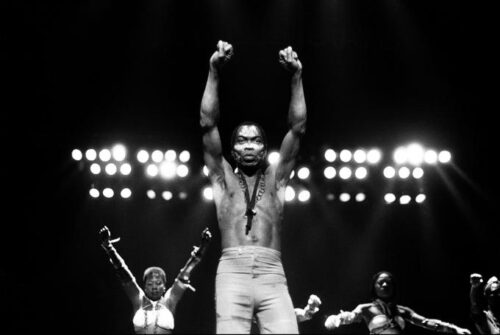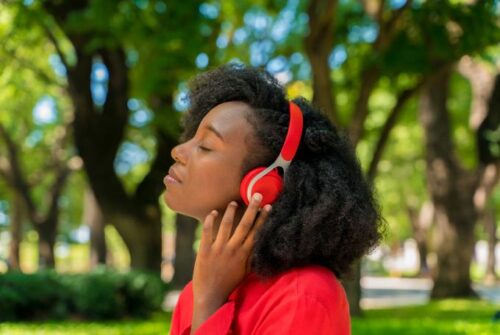Music. The Boom of the Afrobeats.
The music industry is experiencing the fastest global growth in Sub-Saharan Africa (+34.7%). The Spotify platform recorded 13.5 billion streams last year.
The musical trend of the moment comes from Africa and is called Afrobeats. One of the genres most in vogue globally. And not just today, but for many years already. Such is the growth that all the 10 most streamed songs have become hits in the last decade. We mention only the first two: Rema with her Calm Down and Ckay with Love Nwantiti, both in the original version and in the remix version.
A fusion of generations and influences, that of Afrobeats, which makes different genres interact and evolve – from highlife to fuji and Juju and then hip hop and reggae.

Fela Kuti during one of his performances. Photo Archive.
It should be noted that there is a difference between Afrobeat and Afrobeats. The first refers to Fela Kuti, legend of the musical genre, who combined highlife, jazz, funk and Yoruba musical influences and whose lyrics were messages and political protests.
The second – which began to be used during the first decade of 2000 – has further musical influences and the lyrics are much less committed and demanding. Another element is that many Afrobeats songs are in West African languages, or with some lyrics such as Pidgin English, Yoruba, Ibo, Twi, or Ewe. And then, obviously, there is the rhythm, that irresistible rhythm, a derivation of the traditional beats of drums and percussions of various kinds.
According to data from the Global Music Report in 2022, the sub-Saharan region recorded the fastest growth globally in the music industry – as much as 34.7%. This growth was driven largely by a significant increase in revenues in the region’s largest market, South Africa (+31.4%). And naturally marked by the emergence of the genre.
All we need to do is look at Spotify’s numbers. Last year, streaming of Afrobeats songs reached 13.5 billion. A 550% growth since 2017, when online ratings concerned 2 billion people. An explosion so powerful as to induce the platform to create a satellite site, Afrobeats: Journey of a Billion Streams, is entirely dedicated to this musical genre.

A young woman listening to music on her headphones. 123rf.com
About 35% of listeners are between the ages of 18 and 24, while 25% are between the ages of 25 and 29. Fans of this musical genre are also Millennials with 16% of streaming ratings by thirty-year-olds. And it must be said that the age of Afrobeats enthusiasts goes much further. Boys and adults from Lagos as well as from London or Paris, who live in Rotterdam or Accra, Nairobi, or Toronto.
It is always the data collected by Spotify that tells the story. But this platform is joined by others popular on the continent; not only YouTube but also, for example, Boomplay, a multimedia download and streaming service centred on Africa and born in Africa (Nigeria).

Gyakie is a Ghanaian Singer. CC BY-SA 4.0/ Foster Aggor
After all, today – as Jocelyne Muhutu-Remy, head of Spotify for sub-Saharan Africa explains – artists know how to make better use of their talent and know the power of streaming and how to use it. And they will increasingly implement sophisticated marketing strategies not only to reach audiences that already love them but to refine their branding and tailor their music to specific markets. The peculiarities of the style, a better quality – both in the songs and in the arrangements and in the videos – as well as a structured distribution network, but also of collaborations with the artistic world in various parts of the world, have meant that the genre spread.
While earlier, it was mostly concentrated in the UK, USA, Canada, and France due to the high concentration of Nigerians and other Africans in the diaspora in these countries, now more and more Afrobeats artists are finding a solid footing in Asia, the Middle East, and Europe. In the Middle East, just as in North Africa, in Asia, just as in India, Rema, Ckay, Libianca and Burna Boy occupy the first places in the charts and as the most listened-to streaming Afrobeats artists.
In this panorama, the great success of the female artistic world must also be considered. From the Nigerian Tems, Ayra Starr, Twina Savage, Fave, Yemi Alade, Simi, to the Anglo-Nigerian Darkoo; from Ghanaian Gyakie to Ghanaian-American Amaarae to Cameroonian-American Libianca. This refers just to the top ten.

Chukwuka Ekweani, known publicly as CKay. He is a Nigerian singer-songwriter and record producer.
The prevalence of Nigerian female artists and pressure from Ghanaian ones brings us back to the age-old question: what is the origin of Afrobeats, where was it born?
While today most fans believe that it was Nigeria that gave birth to it – after all, it gave birth to Fela Kuti – the story tells of clubs where in Accra in the 1920s, bands that were very famous at the time spread the sounds of the highlife. The term is said to derive from the habits of the African elite, from a kind of beautiful life (even in aesthetic terms) carefree and without problems. And much of this ‘ideal’ has no doubt been siphoned off into Afrobeats. (Open Photo: 123rf.com)
Antonella Sinopoli



